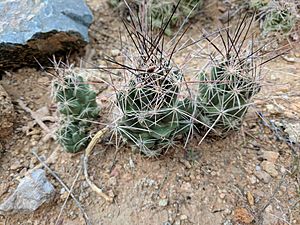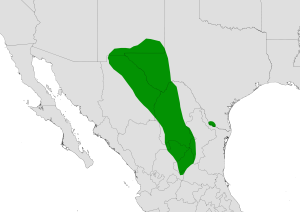Pelecyphora macromeris facts for kids
Quick facts for kids Pelecyphora macromeris |
|
|---|---|
 |
|
| Conservation status | |
| Scientific classification | |
| Genus: |
Pelecyphora
|
| Species: |
macromeris
|
 |
|
The Pelecyphora macromeris is a type of cactus found in the United States and Mexico. It is quite common in the Chihuahuan Desert, where it grows over a wide area. This cactus is known for its unique look and bright flowers.
Contents
What it Looks Like
This cactus usually grows in groups. These groups can be up to 15 centimeters (about 6 inches) tall. They can spread out to 100 centimeters (about 39 inches) wide. The roots of this plant are thick and fleshy.
The cactus stems are round or cylinder-shaped. They are dark green or blue-green. Sometimes, they turn gray-green as they get older. These stems can grow up to 23 centimeters (about 9 inches) tall. They are usually 4 to 8 centimeters (about 1.5 to 3 inches) wide.
A cool thing about this cactus is its "warts." These are very noticeable bumps on the stem. They can be up to 15 millimeters (about half an inch) long. They are shaped like cones or cylinders. Each wart has a small groove that goes about halfway down its length. Sometimes, these warts even produce a sweet liquid called nectar.
The cactus has two kinds of spines:
- Central spines: There are usually one to four of these. They can be black, brown, or gray. They are a bit curved and flexible. They grow to be about 2.5 to 3.5 centimeters (1 to 1.4 inches) long.
- Marginal spines: There are nine to 15 of these. They are thinner and grow around the edges. They are white to brown and about 1.6 to 2.5 centimeters (0.6 to 1 inch) long.
Flowers and Fruit
The flowers of the Pelecyphora macromeris are very pretty. They are bright pink or magenta in color. They grow to be 3 to 5 centimeters (1.2 to 2 inches) long. When they open, they can be 4.5 to 7 centimeters (1.8 to 2.8 inches) wide. The edges of the flower petals have tiny hairs. After the flowers, the cactus grows green fruits. These fruits can be up to 2.5 centimeters (1 inch) long.
Different Types
There are two main types, or subspecies, of Pelecyphora macromeris:
- Pelecyphora macromeris subspecies macromeris
- Pelecyphora macromeris subspecies runyonii
Where it Lives
In the United States, you can find this cactus in Texas and New Mexico. It likes to grow in the shade. You will often see it under other, larger plants. It grows in messy groups or small mounds.
In Mexico, it lives in the states of Chihuahua, Coahuila, San Luis Potosí, and Tamaulipas. It prefers sandy soil in the Chihuahuan Desert. This cactus blooms in late summer. Its beautiful purple or pink flowers appear then. After blooming, it produces its green fruits.
How it Got its Name
The first person to describe this cactus was George Engelmann. He named it Mammillaria macromeris in 1848. The name "macromeris" comes from two Greek words. "Makros" means 'large' and "meros" means 'part'. This name might refer to the cactus's large flowers.
Later, in 1868, Charles Lemaire moved the cactus to a different group, the Coryphantha genus. More recently, in 2022, scientists David Aquino and Daniel Sánchez moved it again. They placed it in the Pelecyphora group. They did this after studying its phylogenetic connections. This means they looked at how it's related to other plants over time.
See also
 In Spanish: Pelecyphora macromeris para niños
In Spanish: Pelecyphora macromeris para niños


